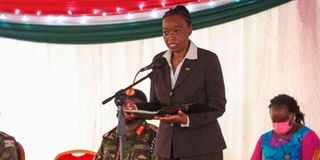Kenya and Egypt sign defence cooperation agreement

Defence Cabinet Secretary, Dr Monica Juma, who signed, on behalf of Kenya, the defence cooperation agreement with Egypt.
Kenya on Wednesday signed a defence cooperation agreement with Egypt, seeking to enhance their military relations in combating common security problems.
Defence Cabinet Secretary, Dr Monica Juma, who signed the agreement on behalf of Kenya, said it will help both countries pursue “partnership in matters of mutual benefit”.
Egyptian Chief of Staff, Lt-Gen Mohamed Farid Hegazy, signed the agreement for his country after holding talks with Dr Juma and Kenya’s Chief of Defence Forces, Gen Robert Kibochi, in Nairobi.
Though details of the agreement were not made public, a defence cooperation with Kenya means Egypt has reached similar arrangements with Sudan, Uganda and Burundi and has been in talks with South Sudan.
Nile Basin states
All these countries have the distinction of being in the Nile Basin, either as sources of riparian states for the Nile, which Ethiopia relies on almost 100 per cent for fresh water.
Egypt has bickered recently with Ethiopia, which is the source of most of the Nile waters, on the mode of filling the Grand Renaissance Dam on the Blue Nile. Cairo argued the filling, without an agreement, threatens its national security and source of water. On the other hand, Ethiopia, which dismisses the fears raised by Cairo, says it will not withhold water, and that it has sovereign rights to use the water.
In the wake of the dispute, both countries have recently engaged in shuttle diplomacy involving all riparian countries.
Egypt has since reached military cooperation agreements with various countries, which analysts think are all linked to preventing any sort of military coalition against it.
Isolating Ethiopia
“It is clear as day they are isolating Ethiopia with a view to military action,” argued Paul Olind, an analyst on the Nile politics.
“It is, however, not inevitable but the timing has to be rather tempting to Cairo given [Prime Minister] Abiy Ahmed’s issues,” he said referring to the internal political crisis in Tigray, border dispute with Sudan as well as imminent elections due next month, the first electoral test for Abiy as head of government.
Kenya has, however, maintained a principle of strategic neutrality and has an age-old mutual defence pact with Ethiopia which it signed during the days of Emperor Haile Selassie.
Nairobi, one diplomat told the Nation, believes that a discussion can yield an amicable solution to the sharing of the Nile, making it needless to pick on the military option.
“There are two issues; no one country can claim an entire share of the water. But we have to be realistic because the demands for water in our countries have risen significantly,” the official told the Nation.
Get mutual solution
“So it is prudent that people sit down and agree on a mutual solution, based on this reality. We don’t see any problem here.”
Ethiopia has insisted on the use of African Union mechanisms to resolve the dispute, which has already gone various rounds without a solution. Egypt has suggested that the UN be involved.
Dr Rashid Abdi, a Kenyan analyst on the Horn of Africa, argues that the visits by the Egyptian army chief signal Cairo’s continued strategy to ring-fence its Nile strategy, and that a defence cooperation strategy should be seen as a sign of growing ties.
“Egypt’s President Abdel Fattah al-Sissi will be in Djibouti this week to meet with [President Ismail] Guelleh. This will complete Cairo’s strategic ring of influence in the Horn.
“Cairo has outflanked and outmanoeuvred Ethiopia. Addis is set on July filling of the GERD,” he wrote on his Twitter page on Wednesday.




